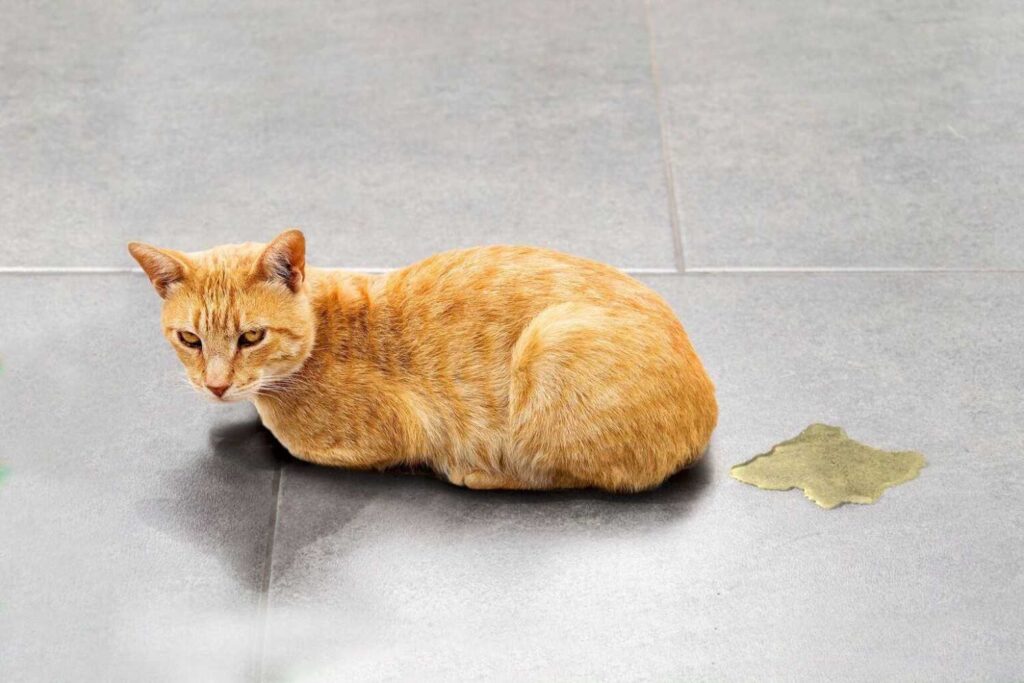Has your cat suddenly started peeing in the house? This can be frustrating and worrying for pet owners. Cats are usually good at using their litter boxes, so if they begin urinating outside the box, it’s often a sign that something is wrong. The good news is that with some understanding and patience, you can find out why this is happening and help your cat return to their usual habits.
In this article, we’ll look at some common reasons for cats peeing in the house and what you can do to fix it.

Medical Reasons for Peeing in the House
One of the first things you should do if your cat is peeing in the house is to take them to the vet. Sometimes, health problems can cause changes in bathroom habits. For example, urinary tract infections (UTIs), bladder stones, or kidney issues can make it painful for cats to urinate. These conditions can lead to them associating the litter box with pain, causing them to pee elsewhere.
If you’re wondering, “Why has my older cat started peeing in the house?” it could be related to aging and medical issues. Older cats, in particular, are more likely to suffer from bladder control problems or other health issues that can cause this behavior.
Here are some signs that your cat might have a medical issue:
Peeing frequently but only producing a small amount
Crying or straining while urinating
Blood in the urine
Acting lethargic or showing a change in appetite
If your cat shows any of these signs, a vet check-up is essential. Once a medical problem is treated, your cat will likely return to using the litter box properly.
Litter Box Problems
If your cat is healthy, the next thing to consider is their litter box. Cats are clean animals, and they have specific preferences when it comes to their bathroom habits. If the litter box isn’t clean, is in the wrong location, or the litter is uncomfortable, your cat may avoid it and start peeing around the house instead.
Some common litter box issues include:
1. Dirty Litter Box
Cats don’t like using dirty litter boxes. If you’re not scooping out the litter daily or cleaning the box regularly, your cat might look for another place to go. Imagine how you would feel if your bathroom was constantly dirty!
2. Wrong Litter Type
Some might prefer soft, sandy textures, while others might like something more grainy. If you’ve recently switched litter brands and now your cat is peeing outside the box, the new litter might be the problem.
3. Box Location
The location of the litter box matters more than you might think. Cats need privacy when using the bathroom, but they also don’t want to feel isolated or unsafe. Placing the litter box in a busy area or somewhere noisy can cause your cat to avoid it. Try moving the litter box to a quiet, low-traffic area in your home.
4. Wrong Size or Type of Litter Box
The size and design of the litter box can also make a difference. If your cat feels cramped in a small box or doesn’t like covered boxes, they may start peeing in other areas of the house. Make sure the box is large enough for your cat to turn around and feel comfortable.
Stress and Anxiety
If you’ve ruled out medical and litter box issues, another reason your cat might be peeing all over the house could be stress or anxiety. Cats are creatures of habit, and even small changes in their environment can cause them to become stressed.
Here are some things that might be stressing your cat:
Moving to a new home: Moving can be overwhelming for cats. The unfamiliar environment might make them anxious, and they may start marking their new territory by peeing in different places.
New family members or pets: If you’ve recently added a new pet or baby to your household, your cat may feel threatened or insecure. This could lead to inappropriate urination.
Changes in routine: Cats love routine. If you’ve recently changed your schedule, started coming home late, or altered your cat’s feeding times, they may become stressed.
Helping your cat feel safe and secure again can reduce stress. Try to stick to a consistent routine and provide a calm, quiet space for your cat. You can also spend extra time playing with them to relieve anxiety. There are also calming sprays and diffusers available that mimic natural cat pheromones, which can help reduce stress.
Territorial Marking
Another common reason cats start peeing around the house is to mark their territory. Cats, especially those who aren’t spayed or neutered, may pee in different places to mark areas they think belong to them. This behavior is especially common in male cats, but female cats can also do it.
Territorial marking usually involves your cat spraying urine onto vertical surfaces like walls or furniture. If your cat is marking their territory, you’ll notice that the urine is sprayed in small amounts rather than puddles.
Here are some ways to prevent territorial marking:
Spaying or neutering: If your cat isn’t already spayed or neutered, getting this procedure done can greatly reduce or stop marking behavior.
Reduce stress: As we mentioned before, stress can trigger marking behavior. Try to minimize changes in the environment and offer your cat more attention to make them feel secure.
Limit access to other cats: If your cat sees other cats outside, they might start marking territory to ward off “intruders.” Blocking windows or using cat deterrents outside can help.
Aging and Cognitive Issues
If your older cat has started peeing in the house, it could be due to cognitive decline. Just like humans, cats can suffer from age-related problems like confusion or memory loss. They may forget where the litter box is or have trouble controlling their bladder.
Signs of cognitive decline in older cats include:
- Disorientation or confusion
- Changes in sleeping patterns
- Forgetting familiar places or routines
- Increased vocalization, especially at night
If you suspect that your cat’s age is affecting their bathroom habits, speak to your vet. They may recommend dietary changes, supplements, or medications to help improve your cat’s cognitive function.
How to Stop Your Cat from Peeing in the House
Now that we’ve explored the possible reasons for your cat’s behavior, let’s talk about what you can do to fix the problem.
1. Visit the Vet
If your cat has started peeing in the house, the first step should always be a vet visit to rule out any medical issues. Once any health problems are treated, your cat should start using their litter box again.
2. Clean the Litter Box
Make sure the litter box is clean, large enough, and located in a quiet, convenient spot. If you have multiple cats, you may need more than one litter box.
3. Reduce Stress
Try to minimize changes in your cat’s environment and routine. Offer them a calm, safe space and give them extra attention to help them feel secure. You can also try using calming products designed for cats.
4. Consider Spaying or Neutering
If your cat isn’t spayed or neutered, getting this done can stop territorial marking behavior.
5. Use Enzyme Cleaners
If your cat has already peed in the house, clean the spots thoroughly with an enzyme cleaner. These cleaners break down the urine smell, so your cat won’t be tempted to pee there again.
Frequently Asked Questions (FAQ)
1. Why is my cat peeing all over the house?
Your cat may be peeing all over the house due to medical issues, stress, territorial marking, or dissatisfaction with the litter box. A vet visit can help rule out any health problems.
2. Why has my older cat started peeing in the house?
Older cats may pee in the house due to age-related issues like cognitive decline, arthritis, or kidney problems. These conditions can make it harder for them to use the litter box.
3. How do I stop my cat from peeing in the house?
To stop your cat from peeing in the house, visit the vet, clean the litter box regularly, reduce stress, and ensure the litter box is placed in a quiet, accessible area. Spaying or neutering may also help.
4. Can stress cause my cat to pee in the house?
Yes, stress can cause inappropriate urination in cats. Changes in their environment, routine, or the introduction of new pets can trigger this behavior. Reducing stress can help.
5. Does changing the litter affect my cat’s peeing habits?
Yes, some cats are picky about litter type. If you’ve recently switched litter and your cat has started peeing outside the box, try returning to the old litter or trying a different one.
6. How can I tell if my cat is marking territory?
Cats that mark territory often spray small amounts of urine on vertical surfaces like walls. This behavior is more common in unspayed or unneutered cats and is triggered by territorial instincts.
7. Should I take my cat to the vet if they start peeing in the house?
Yes, if your cat begins peeing in the house suddenly, a vet visit is important to rule out medical issues like urinary tract infections, kidney disease, or bladder stones.
Conclusion
It’s always frustrating when your cat starts peeing in the house, but remember that it’s usually a sign that something is wrong. Whether it’s a health issue, stress, or a problem with the litter box, understanding the cause is the first step to fixing the behavior. By following these tips and being patient, you can help your cat get back to using the litter box properly.
For more helpful advice on caring for your cat, visit CatTopTips where you’ll find tips and solutions for a happy and healthy cat.


